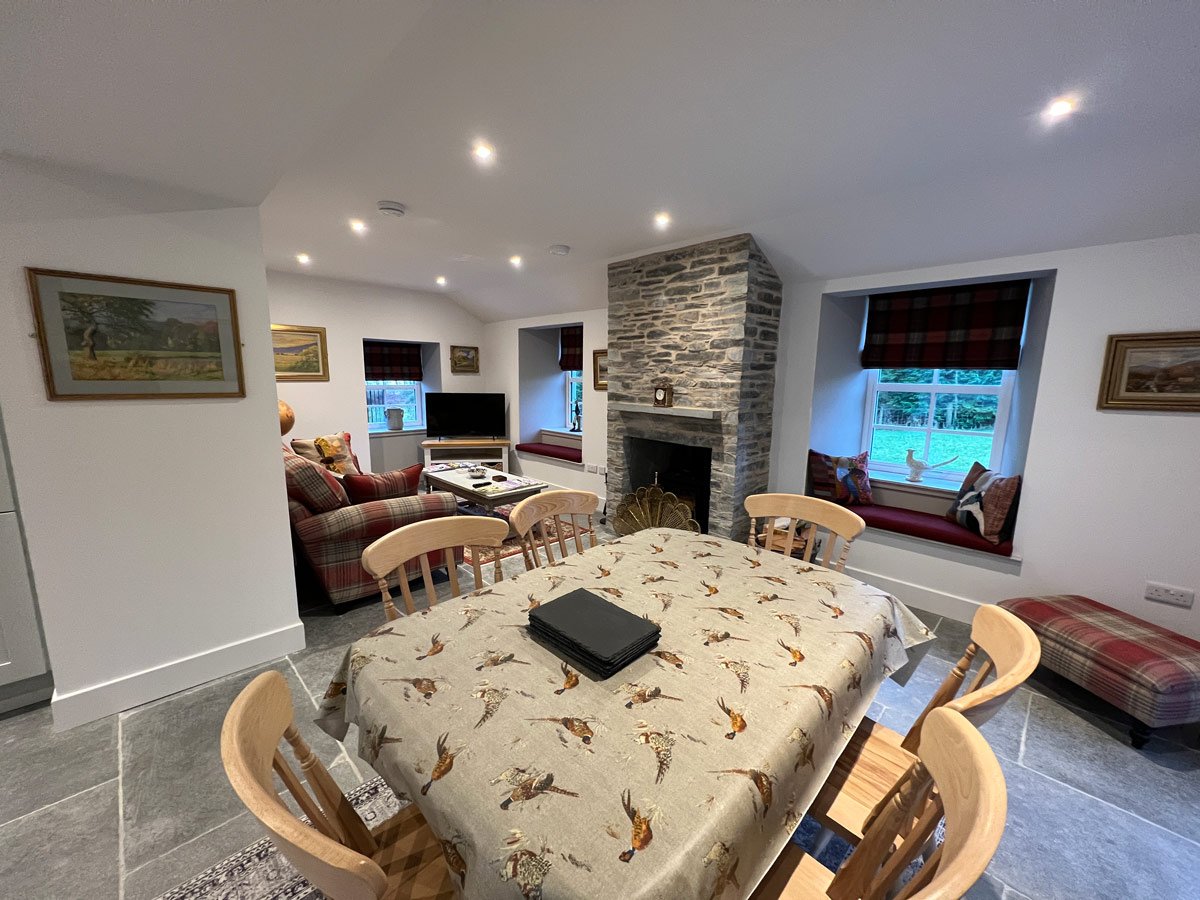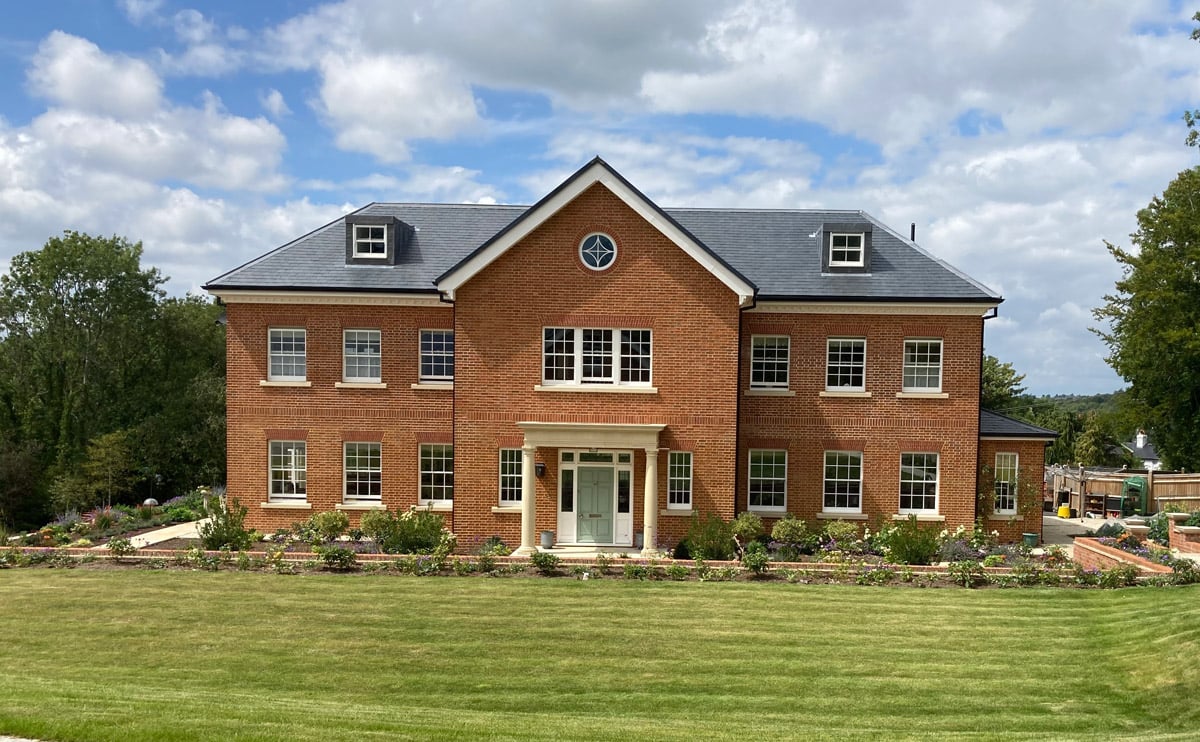If you’ve purchased with the idea of renovating and possibly extending, then – depending upon how major the changes are – the idea of knocking it down and starting afresh may cross your mind. But is this option the right fit for you?
There are many factors to consider when deciding whether to knock down and rebuild your home. It is essential to evaluate the pros and cons of each of these options and to fully understand the factors influencing your decision.
WHICH OPTION IS BEST FOR ME?
Renovating, extending or rebuilding – or those three in some combination – are your primary options when you purchase a plot with an existing building. Each has its own merits and drawbacks based on your budget, the condition of the existing house, your long-term goals and local regulations.
Renovating: Renovating involves refurbishing and improving the existing house while retaining its basic structure. It is an attractive option if the house has good bones, historical value or sentimental significance. Not to be confused with a Retrofit, renovations typically focus on updating the interior, such as replacing fixtures, decorating and upgrading the infrastructure while keeping the original layout intact. Renovating can be cost-effective, especially if the required changes are minor and the house is in good condition. However, extensive renovations can quickly become expensive and time-consuming, particularly if unexpected issues arise during the process.
Extending: Extending involves expanding the existing house by adding new rooms or increasing its footprint. This option is suitable if you need more space or desire a different layout while still retaining the core structure. Extensions can be built upwards (adding another floor), outwards (extending the ground floor) or even below ground (basements). Extending offers flexibility in terms of design and allows you to customise your home according to your needs. However, it is important to consider the local planning regulations, as there might be restrictions on the size and style of extensions. Additionally, the cost of extending can vary significantly depending on factors such as the size of the extension, materials used, and complexity of the construction.
You can find out more about extensions here:
Rebuilding: Rebuilding involves demolishing the existing house and constructing a completely new one in its place. This option provides the highest level of customisation and flexibility, as you have the freedom to design a new home that perfectly suits your preferences and lifestyle. Rebuilding also allows you to take advantage of modern building techniques and the latest technologies. However, rebuilding is generally the most expensive option, as it involves significant demolition and construction costs. It is also important to consider any additional expenses associated with obtaining planning permissions, architectural designs and temporary accommodation during the construction period. WHICH OPTION IS THE CHEAPEST?
WHICH OPTION IS THE CHEAPEST?
As discussed earlier, the costs are related to your project brief. The more significant alterations to the existing building envelope, structure and services will have a greater effect on overall costing, while cosmetic upgrades and changes to non-structural walls will be comparatively limited in cost. Here's an idea of what you'll be paying with each project type:
| PROJECT | AVERAGE COST |
| Extend | £3,000 - £4,000 per m² |
| Renovate | £30,000 to over £100,000 |
| Demolition | £5000 - £20,000 |
One starting point is to assess the current state of the building and estimate the level of repair or refurbishment required. Then consult with contractors, architects or quantity surveyors to obtain detailed quotes for the specific renovations you have in mind. They will consider factors such as materials, labour, potential unforeseen expenses and any required repairs. This will allow you to review the quotes alongside your budget to determine the financial feasibility of renovations. These quotes can then be compared with typical new build costs to give you a sense of which option aligns best with your budget.
But, if you’re like most of us who are looking at the rising costs of energy, build costs may not be your only consideration: ongoing costs related to maintenance and utility bills will likely factor in as well. Rebuilding with a replacement dwelling may offer higher energy efficiency and lower maintenance costs in the long run.
 VAT (Value Added Tax) reclaims are another consideration related to the overall cost. Generally, VAT reclaims are more commonly applicable to new construction projects rather than renovations. However, certain renovation activities may qualify for reduced VAT rates or exemptions. A tax authority or your tax adviser will be able to guide you on the eligibility criteria, required documentation and procedures for VAT reclaims, if applicable.
VAT (Value Added Tax) reclaims are another consideration related to the overall cost. Generally, VAT reclaims are more commonly applicable to new construction projects rather than renovations. However, certain renovation activities may qualify for reduced VAT rates or exemptions. A tax authority or your tax adviser will be able to guide you on the eligibility criteria, required documentation and procedures for VAT reclaims, if applicable.
All of these must be compared against your return on investment with the value of the local real estate. If you are planning to live in the property as a long-term investment, this may have less of an impact on your decision; however, if your decision is tied to a mortgage or you want to ensure the house can be sold if circumstances change, it is important to invest appropriately in the development.
DO I NEED PLANNING PERMISSION?
In most cases, obtaining planning permission is necessary for significant construction projects, such as a complete demolition and rebuild. For extensions and renovations, there are elements that are allowed under permitted development. Your local authority or an architect can guide you through the planning permission process. The key areas related to whether it is required (and may have an effect even in the case of what might normally be allowable under Permitted Development Rights) are:
- Local Planning Regulations: These regulations outline the requirements for obtaining planning permission and the circumstances under which it is necessary.
- Conservation Areas and Listed Buildings: If your property is located within a conservation area or the building itself is listed, there are likely to be guidelines regarding demolition and new construction.
- Design and Impact on Surroundings: When considering a large renovation or complete rebuild, the design and impact on the surrounding environment and neighbouring properties are key factors. Planning authorities assess the design aesthetics, impact on the local area and potential disruptions during construction when evaluating planning applications.
AM I ALLOWED TO KNOCK DOWN THE EXISTING BUILDING?
If you are considering demolishing an existing building, it’s important to first understand if that is permitted. There are two primary considerations relative to this question: requirements from your lender and requirements within the local authority.
Lender requirements: When you have an existing mortgage on your home, knocking it down and rebuilding may have implications related to your loan agreement, particularly terms and conditions, lender approval and revaluation financing. They may also be able to provide you with options related to construction financing. As the specifics of your mortgage agreement and the policies of your lender will determine whether you are allowed to knock down and rebuild your home, it is critical to seek your lender’s advice pertaining to your unique circumstances.
Regulations: Some areas have restrictions on demolitions, particularly for properties in designated conservation areas or with historical significance. In such cases, obtaining the necessary approvals may be more challenging. Understanding the local planning regulations and, generally, the regulations specific to your project location will help you determine the feasibility of your project.
WHAT ARE THE MOST COMMON REASONS TO KNOCK DOWN AND REBUILD?
If rebuilding is an option that is financially viable, is likely to achieve planning, and the demolition of the existing building is permitted, there are several reasons why people opt for this development route:
- Structural concerns: If your existing home has significant structural issues, such as foundation problems, extensive water damage or deteriorating infrastructure, rebuilding can provide a fresh start and eliminate these issues as well as unforeseen costs.
- Outdated design and functionality: Many older homes lack the layout and functionality desired by modern homeowners. Knocking down and rebuilding enables you to create a home that meets your specific needs, including open floor plans, larger rooms or additional living spaces.
- Personalisation and Customisation: Building a new home allows you to incorporate your preferred architectural style, design elements and personalised features that align with your lifestyle and tastes.
- Future-proofing: As technology advances and sustainability becomes increasingly important, some homeowners choose to rebuild in order to incorporate eco-friendly features, energy-efficient systems and smart home technologies.
- Potential financial benefit: There is potential financial benefit depending upon the particulars of your situation and the property. There are a few reasons for this:
- Increased property value: By constructing a new home with modern amenities, energy-efficient features and an appealing design, you may increase the value of your property. UK Estate agents say home buyers are spending 15% more for energy efficicient properties.
- Energy efficiency and reduced maintenance: Newer constructions often incorporate the latest technologies and building materials, resulting in improved energy efficiency and reduced maintenance costs in the long run.
- Cost control: Starting from scratch allows you to have more control over the budget and avoid unforeseen repair or renovation expenses that may arise in an older property.
 DECIDING WHETHER TO RENOVATE, EXTEND OR REBUILD
DECIDING WHETHER TO RENOVATE, EXTEND OR REBUILD
Now that you're more informed on your choices, it's time to start thinking about which one to go for. It's not an easy decision by any means, but here are our top tips for making the right call:
- Assess the total scope: Depending upon the current condition of the property, you may be leaning in one direction versus another as it relates to project cost, project risks and development timescale.
- Review local planning guidance: Determining whether you need planning permission depends on various factors, including local regulations, property location and the extent of the changes you plan to make.
- Discuss with our mortgage lender: Review your mortgage agreement and consult with your lender to understand any limitations, clauses or conditions regarding major modifications or demolitions.
- Consider financial costs as well as benefits: Your current building has running costs as well as renovation costs associated with re-developing it, whereas a new build has more certainty in the overall running costs but is likely to come at a greater construction cost.
- Seek professional advice: To make an informed decision, consult professionals specialising in architecture, construction or even financial planning.
Making the decision to renovate, extend or rebuild is all about evaluating your needs and surroundings. First, look at the requirements for planning permission requirements, lender restrictions and costs. Then, engage professionals to help assess your property, obtain accurate cost estimates, navigate the planning process and provide financial guidance. With their expertise, you can make an informed choice that aligns with your vision.
For more Self Build advice, take a look at the learning centre or follow the link below to arrange a free initial consultation with one of our team.




